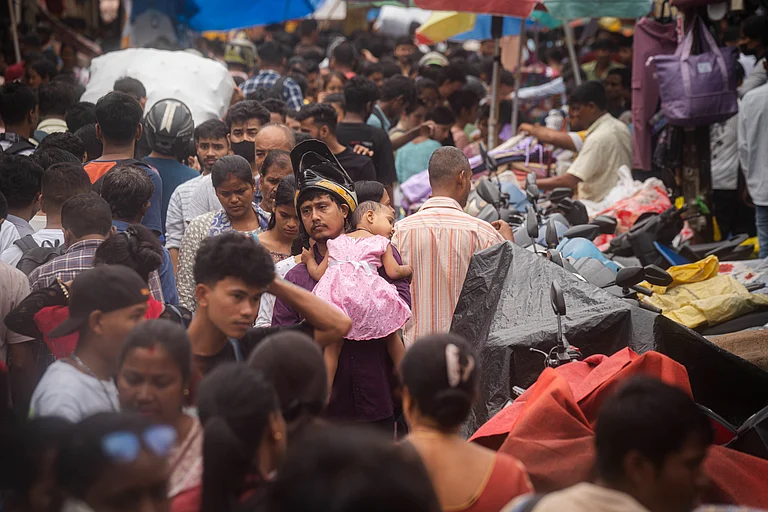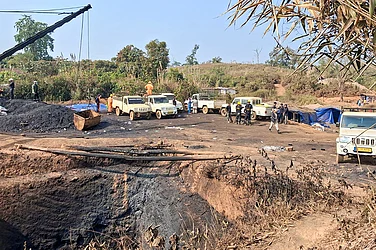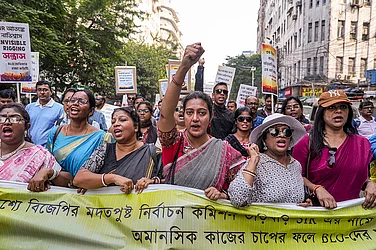Finance Minister Nirmala Sitharaman made history by presenting her sixth consecutive budget. During the Interim Budget announcement, she confirmed no changes in tax slabs. Sitharaman emphasized the government's commitment to placing the Indian economy on a robust and sustainable growth trajectory, outlining achievements and future goals under the Modi administration.
Following the budget speech, people usually express their views on income tax slabs, railways budget, and allocations for various sectors such as education, health, infrastructure, banking, agriculture, defense, and IT.
Here are a few reactions to the budget:
Prime Minister Modi, speaking on the Union Interim Budget 2024-25, highlighted its inclusivity and innovation, expressing confidence in its continuity. He emphasized its impact on the four pillars of Viksit Bharat - youth, the economically disadvantaged, women, and farmers. The Prime Minister stated that the budget is a step towards making India a developed nation by 2047.
PM Modi noted the budget's reflection of the aspirations of a young India, revealing two crucial decisions. A significant allocation of Rs 1 Lakh Crore has been dedicated to a fund for research and innovation. Additionally, he highlighted the fiscal responsibility maintained in the budget, with a historic high capital expenditure of Rs 11,11,111 Crore. This, according to the PM, is a 'sweet spot' in economic terms, aiming to build 21st-century infrastructure and generate numerous job opportunities for the youth.
The budget also prioritizes the empowerment of the poor and the middle class, focusing on creating new employment opportunities. PM Modi announced plans for the construction of 2 crore more houses for the underprivileged. He expressed the goal of having 3 crore 'Lakhpati Didis' and extending the benefits of the Ayushman Bharat scheme to ASHA and Aganwadi workers.
Union Minister Rajeev Chandrasekhar praised the interim budget, describing it as a comprehensive overview of the significant changes in the Indian economy over the past decade.
Ashish Chauhan, CEO of the National Stock Exchange of India (NSE), praised the Union Interim Budget 2024-25, saying it follows the government's proven strategy of balancing fiscal responsibility, welfare measures, and economic growth. He rated it a perfect 10 out of 10, noting that while it's an interim budget, it aligns with the government's successful approach developed over the past decade.
Union Minister Nitin Gadkari praised the interim budget for bolstering India's financial sector, supporting PM Modi's goal of making India the world's third-largest economy. He highlighted its focus on boosting exports, encouraging industries, and generating employment opportunities.
Defence Minister @rajnathsingh expressed optimism about the recently presented interim budget by FM Nirmala Sitharaman. He stated, "The interim budget gives us hope for the future. Based on the signals it provides, I am hopeful that the Indian economy can reach 5 trillion dollars by 2027 and surpass 7 trillion dollars by 2030."
Congress MP Shashi Tharoor expressed his disappointment with the Union Budget 2024, describing it as both short and lacking substance. According to Tharoor, the speech had major omissions, and several critical issues were left untouched.
Congress MP Manish Tewari highlighted that the only objective of the budget is to facilitate smooth functioning for the government in the upcoming fiscal year's first quarter. The central concern revolves around the fiscal year ending on March 31, 2024, where a budgetary deficit of Rs 18 lakh crore has been observed.
Former National Conference leader Farooq Abdullah expressed cautious optimism about the interim budget, acknowledging the limitations of such budgetary measures. He emphasized the common expectations of the Indian populace, including progress, reduced inflation, industrial growth, employment opportunities, and improvements in healthcare, education, and road infrastructure. Abdullah's remarks reflect the collective aspirations of the public for positive economic and social development.
Shiromani Akali Dal MP Harsimrat Kaur Badal expressed dissatisfaction with the Union Budget, describing it as hollow and lacking provisions for the youth, women, and farmers. She criticized the government's confidence in announcing the budget in July, cautioning against taking any election lightly. Despite the absence of pre-poll freebies, Harsimrat Badal acknowledged the government's self-praise while maintaining her overall disappointment with the budget's content.
Congress MP Adhir Ranjan Chowdhury criticised the Union Interim Budget for 2024-25, questioning its focus on addressing unemployment. He characterised the budget as a political move aimed at garnering support for the upcoming Lok Sabha elections rather than effectively tackling the issue of unemployment.
Assam CM Himanta Biswa Sarma highlighted the significance of the Interim Budget 2024-2025, stating that it aims to solidify India's position as the world's fastest-growing economy and pave the way for the nation to become the third largest economy by 2029 under the leadership of the Prime Minister.








.jpeg?auto=format%2Ccompress&fit=max&format=webp&w=768&dpr=1.0)

















